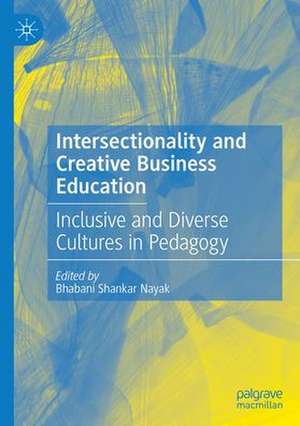Intersectionality and Creative Business Education: Inclusive and Diverse Cultures in Pedagogy
Editat de Bhabani Shankar Nayaken Limba Engleză Hardback – 30 iun 2023
Advancing different theoretical trends within intersectionality and the limits of its praxis, contributors deal with different forms of inequalities based on class, gender, race, religion and belief, sexual orientation, and disabilities in teaching and learning. It is important to articulate and outline the critical lineages of intersectionality within creative business education and its progressive potentials for pedagogical transformation.
Preț: 1070.38 lei
Preț vechi: 1305.34 lei
-18% Nou
Puncte Express: 1606
Preț estimativ în valută:
204.83€ • 215.43$ • 171.15£
204.83€ • 215.43$ • 171.15£
Carte disponibilă
Livrare economică 18 decembrie 24 - 01 ianuarie 25
Preluare comenzi: 021 569.72.76
Specificații
ISBN-13: 9783031299513
ISBN-10: 3031299515
Pagini: 211
Ilustrații: XXXIV, 211 p. 3 illus.
Dimensiuni: 148 x 210 mm
Greutate: 0.25 kg
Ediția:2023
Editura: Springer Nature Switzerland
Colecția Palgrave Macmillan
Locul publicării:Cham, Switzerland
ISBN-10: 3031299515
Pagini: 211
Ilustrații: XXXIV, 211 p. 3 illus.
Dimensiuni: 148 x 210 mm
Greutate: 0.25 kg
Ediția:2023
Editura: Springer Nature Switzerland
Colecția Palgrave Macmillan
Locul publicării:Cham, Switzerland
Cuprins
Introduction (Intersectionality in Creative Business Education) by Prof. Bhabani Shankar Nayak.- Chapter-1 Intersectional Labour and Marginalisation in Business Education Curriculum by Prof. Bhabani Shankar Nayak.- Chapter-2 Exploring interculturality in Higher Education; How can we be inclusive of diverse cultural perspectives in international Higher Education? by Dr Frank Fitzpatrick.- Chapter-3 The purple pound and the representation of disabled in advertising by Dr Hyunsun Yoon, Dr Junxiong Li (Shawn) and Dr David Bourroughs.- Chapter-4 Workforce, Creativity and Post Lockdown Reality by Dr Simon Das.- Chapter-5 Managing creativity and learning from lock-down working patterns: is it all in the mind of the ‘Tuesday to Thursday’ workers? By Dr Simon Das and Dr Vince Madeiros.- Chapter-6 Structureless Pedagogies in Higher Arts Education: Freedoms & Inequalities by Dr Sarah Scarsbrook. Chapter-7 Keep it to myself: The effects on knowledge withholding in team learning within the classroom by Dr Francisco Trincado-Munozi, Dr Caglar Bideci, Dr Shawn Li and Dr Roopa Nagaraju. Chapter-8 Do #blacklivesmatter in the education of fashion business students? by Dr Julie Blanchard-Emmerson.- Chapter-9 Role of Intercultural communication in creative business education by Kathleen Hinwood and Laura Holme.- Chapter-10 Limits of Intersectionality as a theoretical framework by Prof Bhabani Shankar Nayak.
Notă biografică
Bhabani Shankar Nayak is a political economist and works as Professor of Business Management and Programme Director of Business School for the Creative Industries, UCA, Epsom, United Kingdom. His research interests consist of closely interrelated and mutually guiding programmes surrounding political economy of development, religion, business, and capitalism. He is the author or Editor of Political Economy of Gender and Development in Africa (Palgrave Macmillan, 2023), Creative Business Education (Palgrave Macmillan, 2022), Political Economy of Development and Business (Palgrave Macmillan, 2022), Modern Corporations and Strategies at Work (Springer, 2022), China: The Bankable State (Springer, 2021).
Textul de pe ultima copertă
Creative Business Education is emerging rapidly to address the needs of the creative industries including digital media, journalism, advertisement, music, marketing, films, fashion and sports business etc. Inclusive educational praxis, decolonial knowledge traditions and diverse curriculums are central to egalitarian economic development and human empowerment. As such, this edited volume explores how creative business education specifically can help to build a more diverse and inclusive environment for an increasingly diverse body of students and faculty. It discusses how students can be encouraged to succeed and excel, reflecting on the need for academic pedagogies to embrace greater inclusivity for diverse cultures.
Advancing different theoretical trends within intersectionality and the limits of its praxis, contributors deal with different forms of inequalities based on class, gender, race, religion and belief, sexual orientation, and disabilities in teaching and learning. It is important to articulate and outline the critical lineages of intersectionality within creative business education and its progressive potentials for pedagogical transformation.
Bhabani Shankar Nayak is a political economist and works as Professor of Business Management and Programme Director Business School for the Creative Industries, UCA, Epsom, United Kingdom. His research interests consist of closely interrelated and mutually guiding programmes surrounding political economy of development, religion, business, and capitalism. He is the author or Editor of Political Economy of Gender and Development in Africa (Palgrave Macmillan, 2023), Creative Business Education (Palgrave Macmillan, 2022), Political Economy of Development and Business (Palgrave Macmillan, 2022), Modern Corporations and Strategies at Work (Springer, 2022), China: The Bankable State (Springer, 2021).
Bhabani Shankar Nayak is a political economist and works as Professor of Business Management and Programme Director Business School for the Creative Industries, UCA, Epsom, United Kingdom. His research interests consist of closely interrelated and mutually guiding programmes surrounding political economy of development, religion, business, and capitalism. He is the author or Editor of Political Economy of Gender and Development in Africa (Palgrave Macmillan, 2023), Creative Business Education (Palgrave Macmillan, 2022), Political Economy of Development and Business (Palgrave Macmillan, 2022), Modern Corporations and Strategies at Work (Springer, 2022), China: The Bankable State (Springer, 2021).
Caracteristici
This is the first book on creative business education and inclusivity Fills pedagogical gaps within existing literature Reflects the principles of SDG 10 and SDG 4
